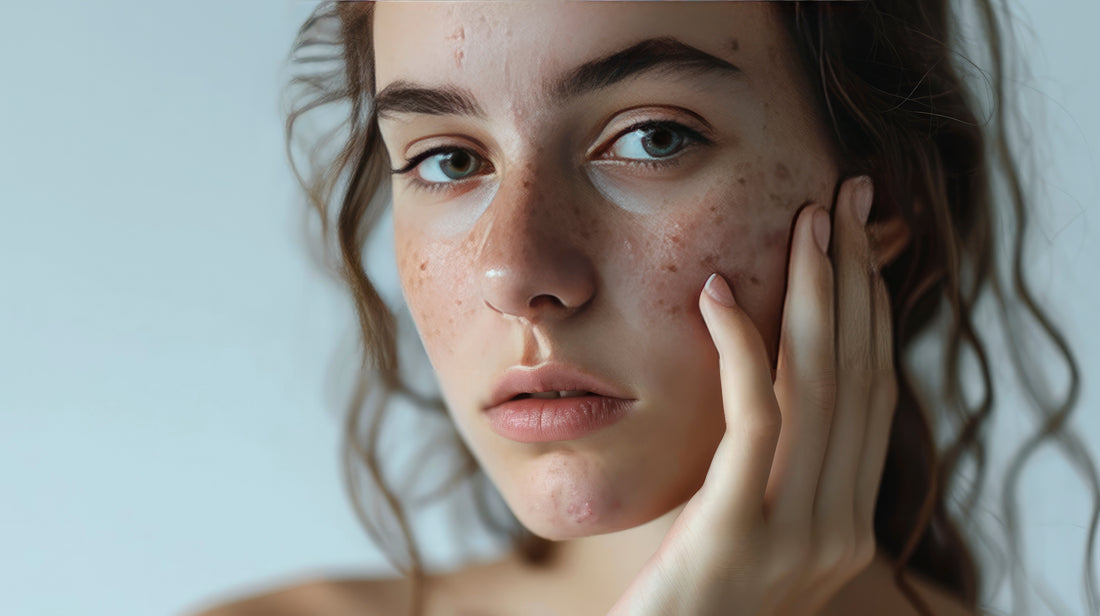
Acne uncovered
The SKINday Times reveals all you need to know about the skin condition affecting 9% of the global population...
Is it just a spot or is it acne? If you suffer from the common skin condition, this is possibly one of the first questions you asked yourself pre-diagnosis. This thought could be shortly followed up with questions including ‘when does acne itself become reason to go to seek professional advice?’ As acne is a medical condition, we spoke to Professor Caitriona Ryan of The Institute of Dermatologists, Ireland for her insight...
What is acne?
Acne is a common condition affecting a huge number of us at some stage of our lives, but what exactly is it? ‘Acne is a multifactorial condition, with a complex interplay between genetics (your family history), hormonal influences, and other environmental factors, including stress and hormonal influences,’ explains Professor Caitriona. ‘Oil glands become oversensitive to hormones, which causes an increase in oil secretion. Follicular openings (pores) become blocked with a higher turnover of dead skin cells, which combined with this excessive oil production causes blackhead formation. The normal bacteria that colonise our skin then multiply and cause inflammatory acne lesions. Increased levels of stress-related hormones such as cortisol sends the skin's sebaceous (oil) glands into overdrive, which clogs the hair follicles (pores), increases inflammation and causes acne breakouts.’
Spot the difference
When it comes to acne, there are also several forms. ‘Cystic acne is a severe form of acne that requires medical attention as it can cause disfiguring scarring and has a significant impact on psychosocial functioning. Acne mechanica is caused by mechanical obstruction of follicular openings, such as the chronic use of a face mask, or using a mobile phone or headset over one side of the face. Cosmetics such as heavy foundations or oil containing moisturisers can induce acne cosmetica by blocking pores. Hair products (particularly oils and gels) can cause “pomade acne” over the forehead and temples. Certain medications can also cause acne or acneiform eruptions, particularly steroids, some newer chemotherapy drugs and hormonal treatments.’
It’s an unhelpful myth that acne is caused by not washing your face. In fact, common causes of acne include hormones, diet, stress and even contraception. ‘Oestrogen containing pills can be very helpful in controlling hormonal acne. Progesterone-only pills or implantable devices (e.g. Implanon) may cause worsening of acne. Non-hormonal IUDs do not cause skin flare ups. It is very rare for progesterone-containing IUDs to cause acne as the progesterone acts locally and systemic (blood) levels of progesterone are typically very low/negligible.’
Treatment options
‘While oral antibiotics and hormonal therapies (oral contraceptive pill and spironolactone) can help reduce inflammation they do not have a curative potential. Typically, isotretinoin (Roaccutane) is required to successfully treat cystic acne. Roaccutane is a Vitamin A derivative which normalises the function of the skin, by reducing the production of sebum (oil) and by inhibiting the overproduction of keratin that blocks the pores to cause acne. Almost all patients experience complete clearance of their acne with a course of treatment (approximately 6 months) and approximately 70% of patients remain clear. In those whose acne recurs; a second course of Isotretinoin typically results in permanent clearance. It also improves the overall texture of the skin, open pores, and blackheads. It is rarely associated with serious side effects so can only be prescribed by a Dermatologist. I took Roaccutane myself at the age of 20 for cystic and all seven of the Consultant Dermatologists at the Institute of Dermatologists have also taken Isotretinoin in past. It was life changing for me.’
From potato slices to toothpaste, social media is full of ‘quick fixes’- what are the best and worst DIY skincare hacks you have come across when it comes to attempting to treat acne? ‘I think that everyone in Ireland has tried Sudocrem and toothpaste to treat their acne with little benefit. Using Green Tea or diluted apple cider vinegar to treat mild acne breakouts can be helpful.’
Treating at home
‘When selecting skincare products for acne-prone skin, it is important to choose formulations that are non-comedogenic (i.e. won't clog pores/non-blackhead forming) and contain ingredients that have been shown to be effective in treating acne,’ advises Professor Nicola Ralph, Dermatologist at the Institute of Dermatologists, Ireland. ‘Some ingredients that may be beneficial for acne-prone skin include:
Salicylic acid: Salicylic acid is a beta hydroxy acid (BHA) that helps exfoliate dead skin cells and unclog pores. It also has anti-inflammatory properties that can help reduce redness and irritation in the skin.
Benzoyl peroxide: Benzoyl peroxide is an antibacterial agent that can help kill the bacteria that cause acne. It also has anti-inflammatory properties that can help reduce redness and swelling in the skin. But beware it stains clothing, towels, sheets etc.
Retinoids: Retinoids are derivatives of vitamin A that can help regulate skin cell turnover and reduce the formation of new acne lesions. They can be found in over-the-counter formulations in a variety of strengths, and it is important to remember to introduce them to your skincare routine slowly every 2-3 nights and to use moisturiser afterward to prevent redness/irritation of the skin.
Niacinamide for its anti-inflammatory affect on the skin which also helps to reduce redness and the staining from previous acne spots
Azelaic acid: Azelaic acid has both antibacterial and anti-inflammatory properties. It can help reduce the formation of new acne lesions and improve skin texture and tone and is also safe for use during pregnancy.‘
